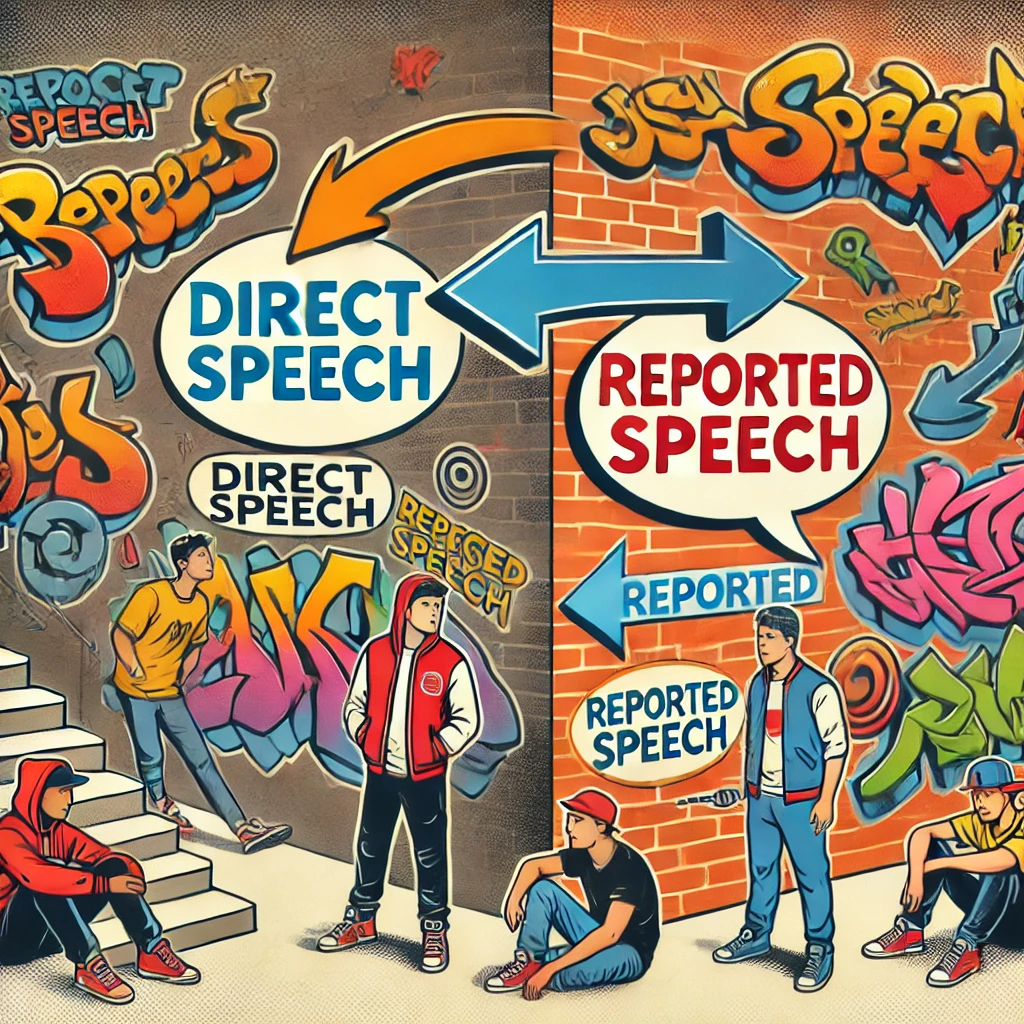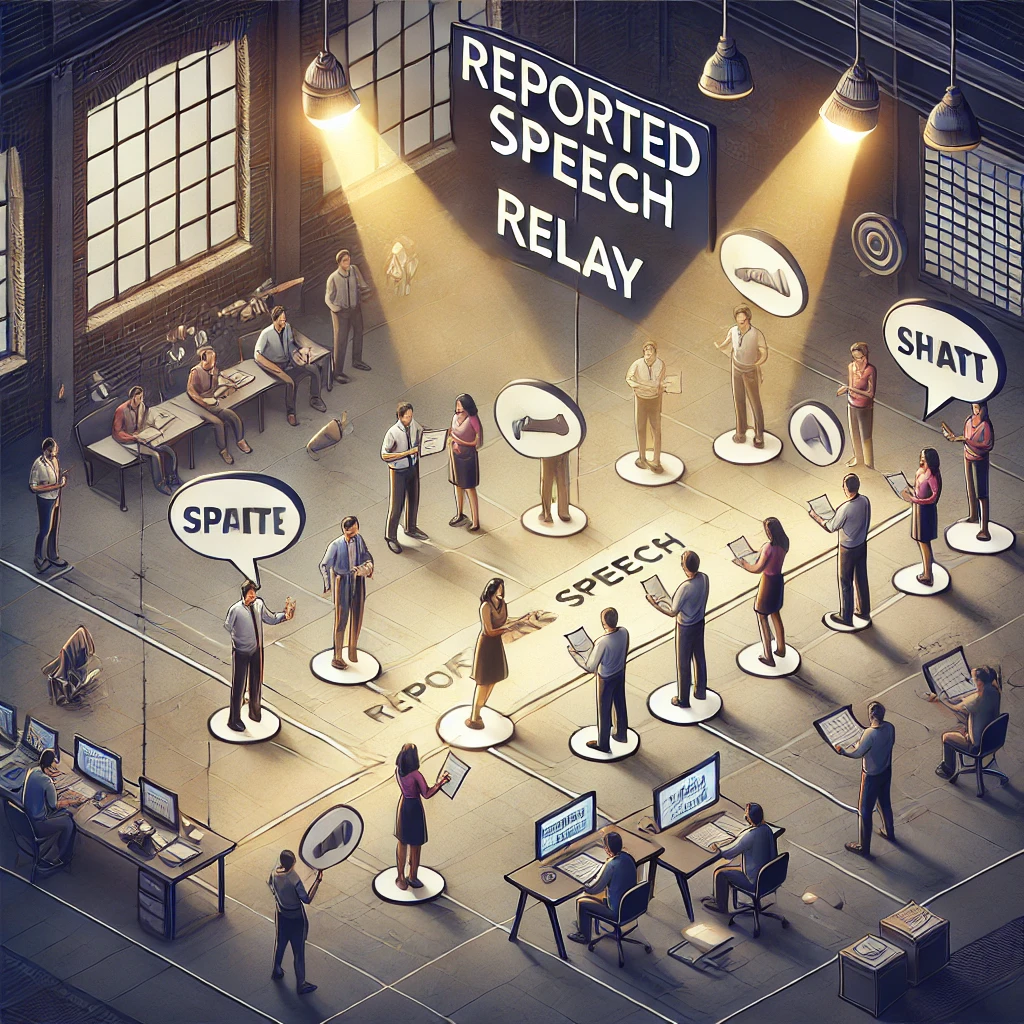REPORTED SPEECH
Reported speech is a key skill in English that allows you to convey what someone else has said without quoting them directly. It’s essential for effective communication, whether you’re sharing information in a conversation, writing a story, or summarizing a speech.

Learning Goals
Understand Reported Speech: Learn the rules and structure for converting direct speech into reported speech.
Apply Reported Speech: Use reported speech accurately in various contexts, including conversations, writing, and presentations.
Differentiate Tense Changes: Understand how to change tenses, pronouns, and time expressions when using reported speech.
Enhance Communication Skills: Improve your ability to relay information clearly and accurately.
Content
Reported speech, also known as indirect speech, is used when you want to tell someone what another person said, without using the exact words. Unlike direct speech, which quotes someone word-for-word, reported speech requires you to make some changes, especially with pronouns, tenses, and time expressions.
How to Convert Direct Speech to Reported Speech
Tense Changes
Present Simple → Past Simple
- Direct Speech: “I live in London.”
- Reported Speech: He said that he lived in London.
Present Continuous → Past Continuous
- Direct Speech: “I am reading a book.”
- Reported Speech: She said that she was reading a book.
Present Perfect → Past Perfect
- Direct Speech: “I have finished my homework.”
- Reported Speech: He said that he had finished his homework.
Past Simple → Past Perfect
- Direct Speech: “I visited Paris last year.”
- Reported Speech: She said that she had visited Paris the previous year.
Past Continuous → Past Perfect Continuous
- Direct Speech: “I was playing football.”
- Reported Speech: He said that he had been playing football.
Future Simple (will) → Conditional (would)
- Direct Speech: “I will call you tomorrow.”
- Reported Speech: She said that she would call me the next day.
Modal Changes
Modals also often change when you report speech. Here are some common changes:
- Will → Would
- Direct Speech: “I will go to the party.”
- Reported Speech: He said that he would go to the party.
- Can → Could
- Direct Speech: “I can swim.”
- Reported Speech: She said that she could swim.
- May → Might
- Direct Speech: “I may travel to Spain.”
- Reported Speech: He said that he might travel to Spain.
- Shall → Should
- Direct Speech: “Shall I open the window?”
- Reported Speech: He asked if he should open the window.
- Must → Had to
- Direct Speech: “I must finish my work.”
- Reported Speech: She said that she had to finish her work.
- Would, Could, Might, Should, Ought to (These generally stay the same in reported speech because they are already in the past tense or represent a hypothetical situation.)
- Direct Speech: “I would like to visit Japan.”
- Reported Speech: He said that he would like to visit Japan.
Pronoun Changes
Pronouns must be changed to match the perspective of the person reporting the speech.
Example:
- Direct Speech: “I will help you.”
- Reported Speech: “He said he would help me.”
Time and Place Changes
Time expressions often change when converting to reported speech.
Examples:
- Direct Speech: “I saw her yesterday.”
- Reported Speech: “He said he had seen her the day before.”
- Direct Speech: “I’ll do it tomorrow.”
- Reported Speech: “She said she would do it the next day.”
Reporting Verbs
Common verbs used in reported speech include “say,” “tell,” “ask,” “explain,” and “mention.”
Examples:
- Direct Speech: “I’m leaving now.”
- Reported Speech: “He said he was leaving then.”
Reported Statements
Definition: Reported statements involve reporting what someone has said without quoting their exact words. Instead of using quotation marks, the statement is integrated into the sentence, and the verb tense is often backshifted.
How to Form Reported Statements
- Present Simple → Past Simple:
- Direct Speech: “I love chocolate.”
- Reported Speech: She said that she loved chocolate.
- Present Continuous → Past Continuous:
- Direct Speech: “I am reading a book.”
- Reported Speech: He said that he was reading a book.
- Present Perfect → Past Perfect:
- Direct Speech: “I have finished my homework.”
- Reported Speech: She said that she had finished her homework.
- Past Simple → Past Perfect:
- Direct Speech: “I watched the movie.”
- Reported Speech: He said that he had watched the movie.
- Future Simple (will) → Conditional (would):
- Direct Speech: “I will call you tomorrow.”
- Reported Speech: She said that she would call me the next day.
Reported Questions
Definition: Reported questions involve reporting what someone asked without using their exact words. Unlike reported statements, reported questions have different structures based on whether the original question is a “yes/no” question or a “wh-” question.
How to Form Reported Questions
- Change in Word Order: The question word order (subject-verb inversion) used in direct questions changes to statement order in reported questions.
- No Question Marks: Reported questions do not use question marks.
- Tense Backshifting: Similar to reported statements, the verb tense is often backshifted.
- Use of “If” or “Whether”: For yes/no questions, “if” or “whether” is used in reported speech.
Examples:
- Wh- Questions:
- Direct Speech: “Where do you live?”
- Reported Speech: She asked where I lived.
- Yes/No Questions:
- Direct Speech: “Are you coming to the party?”
- Reported Speech: He asked if I was coming to the party.
- Question Words (What, Why, How, etc.):
- Direct Speech: “What time does the movie start?”
- Reported Speech: She asked what time the movie started.
- Present Continuous → Past Continuous:
- Direct Speech: “What are you doing?”
- Reported Speech: He asked what I was doing.
- Modal Changes:
- Direct Speech: “Can you help me?”
- Reported Speech: She asked if I could help her.
Example with Tense Backshifting:
- Direct Speech: “Why did you leave early?”
- Reported Speech: He asked why I had left early.
Example with Pronoun Changes:
- Direct Speech: “Will you be at the meeting?”
- Reported Speech: She asked if I would be at the meeting.
Example with Time Changes:
- Direct Speech: “What will you do tomorrow?”
- Reported Speech: He asked what I would do the next day.
Additional Resources:
If you want to continue practicing, you can click on this link: The diary of a double agent-Reported speech
Learning Activities
EGB
Reported Speech Relay
Objective: Practice converting direct speech into reported speech in a fun and competitive way. Instructions:
- Preparation: Write several sentences in direct speech on slips of paper.
- Task: In teams, you will take turns picking a slip of paper, converting the sentence into reported speech, and passing it to your teammate to check and continue.
- Class Activity: The team that correctly converts the most sentences in a given time wins.
- Example: Direct Speech: “I’m going to the store.” Reported Speech: “She said she was going to the store.”

Dialogue to Reported Speech
Objective: Convert dialogues into reported speech.
Instructions:
- Task: Write a short dialogue between two or more characters.
- Writing: Convert the dialogue into a paragraph of reported speech.
- Sharing: Share your paragraph with a partner and discuss any differences in conversion.
- Example: Dialogue: “Tom: I need help with my homework. Sara: I can help you after school.” Reported Speech: “Tom said he needed help with his homework, and Sara offered to help him after school.”

BGU
News Reporting Role-Play
Objective: Practice using reported speech in a simulated news report.
Instructions:
- Pairs: Pair up, with one student acting as a news reporter and the other as the interviewee.
- Task: Conduct a short interview on a current event, with the reporter taking notes.
- Reporting: The reporter then shares the news using reported speech.
- Class Activity: Some pairs present their reports to the class.
- Example: Interview: “The mayor said, ‘We are working hard to improve public safety.'” Reported Speech: “The mayor mentioned that they were working hard to improve public safety.”

Reported Speech Writing Challenge
Objective: Use reported speech in writing a short summary of a speech or conversation.
Instructions:
- Task: Choose a famous speech or conversation from history, literature, or a movie.
- Writing: Write a summary of the speech or conversation using reported speech.
- Class Activity: Share your summary with the class and discuss the tense, pronoun, and time changes.
- Example: Original Speech: “I have a dream that one day this nation will rise up.” Reported Speech: “He said he had a dream that one day the nation would rise up.”

